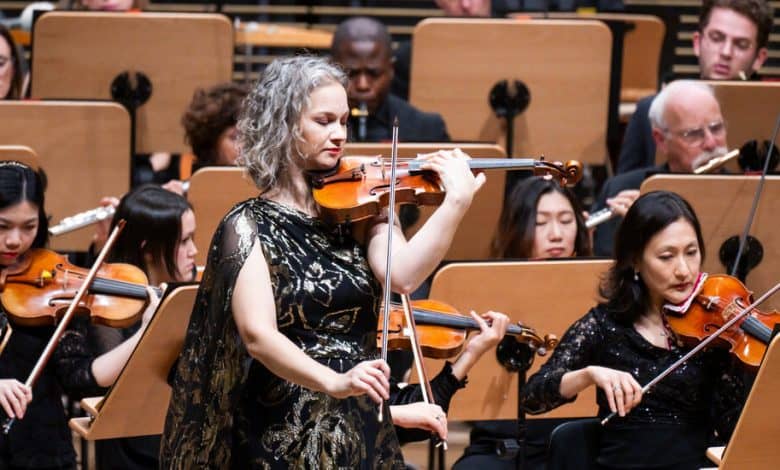Review: Hilary Hahn Gives, and Gets, at the Philharmonic

After the concerto, after the encore, there was still more business to take care of when Hilary Hahn appeared with the New York Philharmonic on Thursday.
She returned to the stage of David Geffen Hall, joined by Deborah Borda, the orchestra’s former leader, and Gary Ginstling, its current one. They had an announcement to make: Hahn — at 44 a star violinist for four decades — had been awarded the Avery Fisher Prize, a $100,000 honor that rewards the good citizens of classical music who have complemented artistic excellence with lasting contributions to the field.
Those contributions are varied but often affirm the vitality of the art form. The violinist Midori, who won in 2001, tours like a roving artist in residence, working with young musicians in small towns far from music capitals like Boston and New York; the flutist Claire Chase, the 2017 winner, is a passionate educator at work on a decades-long project to modernize her instrument’s repertoire; and the cellist Yo-Yo Ma (1978) — well, what isn’t he doing?
Even as a teenager, Hahn was much more than a prodigy. She has always made herself accessible to fans, whether entertaining the longest of autograph lines or letting the public in on her practice sessions on social media. (If you come across #100daysofpractice on Instagram or TikTok, she started that.) She has been a prolific commissioner who insists on recording the works she premieres. And her community engagement, like her “Bring Your Own Baby” concerts for parents and their infants, is as endearing as it is genuinely valuable.
If only there were more than just a taste of all this at the Philharmonic, where Hahn is the artist in residence this season. Thursday’s performance was the first in a series that will include one more subscription program, an evening of Bach solo works and a Nightcap show with the New York City Ballet principal dancer Tiler Peck.
Hahn has done much more in the same post at the Chicago Symphony Orchestra, where she has been in residence since the 2021-22 season. There, she has collaborated with local youth initiatives, and revived her “Bring Your Own Baby” concerts. Her encore from Thursday, Steven Banks’s “Through My Mother’s Eyes,” was written for her time in Chicago.
At the Philharmonic, we just get Hahn the performer. Which, to be fair, is quite something. Her account of Prokofiev’s First Violin Concerto exemplified the golden-age richness and astonishing technique that have long made her a standout in a crowded field. She handles her instrument like a great soprano handles her voice, with muscular lyricism and a luminously penetrating sound capable of reaching the farthest seats at a whisper.
There was a sense of that deceptive softness in a whistling trill near the end of the piece, and as she generously partnered with members of the orchestra: her strumming paired with the wandering melody of Anthony McGill’s clarinet; her muted twinkle adding new color to the opening theme as it flowed from Robert Langevin’s flute.
Elsewhere in the concerto, the orchestra plays a largely supportive role. And it was sensitively balanced yet sufficiently distinct under the baton of Jakub Hrusa, a guest conductor who tends to tame and enliven the Philharmonic’s forceful sound, with a feeling for dramatic shape that befits his recent appointment to the podium of the Royal Opera House in London.
The ensemble was both larger and more showcased in the evening’s opening work, Samuel Coleridge-Taylor’s “Ballade,” from 1898, which had its Philharmonic debut on Thursday. Some in the audience might have been unfamiliar with this chronically underprogrammed composer, but his alluringly chromatic score had much to please them: the lush orchestration of Brahms and Romantic gestures of Tchaikovsky, tightly packaged with the breathlessness of a Dvorak concert overture.
Naturally more of a showcase for the players, though, was Bartok’s Concerto for Orchestra, a beloved reimagining of the Baroque concerto grosso for the 20th century. In a work obsessively precise in its construction — a love letter to sonata and arch forms that unfurls as a roll call of virtuosity — the Philharmonic and Hrusa were freely organic and sounded revelrous, with smiles accompanying the parodic passages of the fourth-movement Intermezzo interrotto.
It was touching for the Bartok to follow the announcement of Hahn’s award. Because while workaday musicians might not have the glamour of a star soloist, they are no less essential to the ecosystem. Not for nothing does McGill, the Philharmonic’s principal clarinet, have an Avery Fisher Prize, too.
New York Philharmonic
This program repeats through Saturday at David Geffen Hall, Manhattan; nyphil.org.